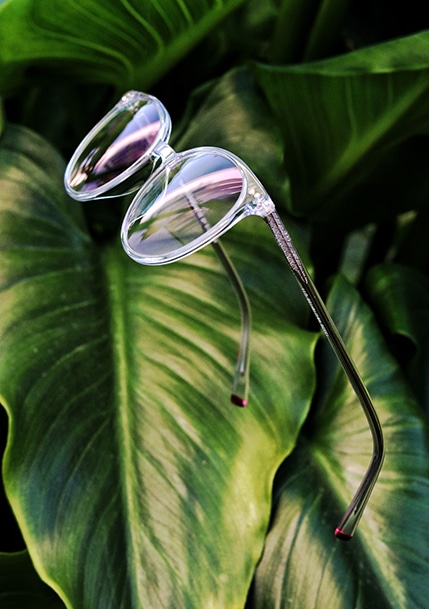2:05 -
© EYESEEmag.com
Another year, another eye test. But this time things have changed. With your new prescription probably comes a new set of glasses. Or perhaps you’ve sat on your glasses and bent them out of shape beyond repair and they now lie redundant in you bedside drawer.
No matter the reason, the question remains: what becomes of the newly-obsolete pair you’re currently wearing?
With around 48% of the population in Europe wearing glasses and a global push towards sustainability an ever-present topic of conversation, it is important to consider how we can reduce, reuse and recycle across all aspects of our lives, eyewear included. Here are some ideas to help reduce the number of old glasses we send to the landfill each year.
© Apostolos Vamvouras
Most good opticians will be able to replace the old lenses with new ones matching your prescription. Depending on your correction, you’ll likely save yourself money, too, by keeping your existing frames.
If your old lenses are made from glass, you can recycle them at your local recycling centre. Plastic lenses will need to be treated differently (continue reading for more information on that).
If your lens prescription is the same but your frames are a little bent out of shape, it is worth asking your optician if there is a chance of repairing them. What may look like a write-off to you could well be saved with the special tools and expert knowledge of a professional. For things like bent arms, snapped nose pads and missing screws, this may be the most eco-friendly and cost effective solution.
Access to eyecare can be taken for granted. In some areas of the world, due to restricted access or lack of resources, glasses are just not an option. As a result, there are many charities that have sprung up to tackle this problem. Vision Aid Overseas, one of the more established charities out there, re-distributes donated glasses to the developing world. Speak to your local opticians to find out if they take part in any donation schemes for your frames and/or lenses.
Though the chances that someone you know has your exact prescription are low, it is worth asking around. If you’re looking to hand off a pair of reading glasses, you might be in luck!
© Apostolos Vamvouras

© Elahe Motamedi
With the growing popularity of peer-to-peer resell sites, it has never been easier to find a buyer for those items you no longer have a need for. Classic styles in neutral colors will typically sell faster than those out-there, bold designs but there is a market for everyone. If you invested in designer frames, you can expect to get back a decent chunk of your money, too. Most secondhand shoppers will be interested in the frames only, so you can pop out the lenses are recycle them separately.
Recycling your old glasses is complex and can be an added drain on resources, but if you’ve considered and exhausted all of the above options, there may be something you can do. If your lenses are made from glass, throw them in your closest glasses recycling bin. Aluminium can be infinitely recycled, so once you have removed the lenses and any other bit, you can leave them at your recycling center. Other materials often used when manufacturing eyewear, such as titanium and acetate, are much more difficult to recycle, especially considering the size of each part. These types of frames should not be thrown out with your recycling.